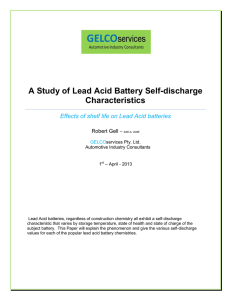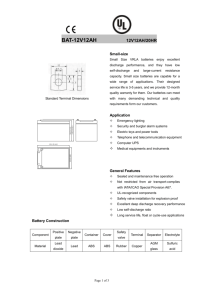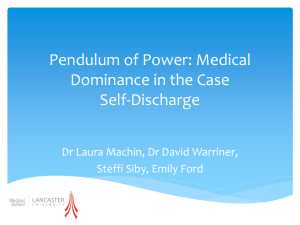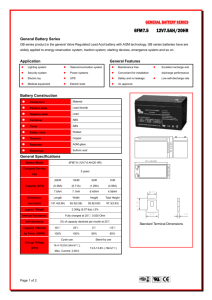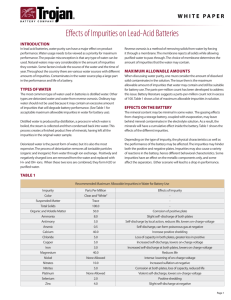The Ethical Aspects of Self-Discharge from Hospital
advertisement
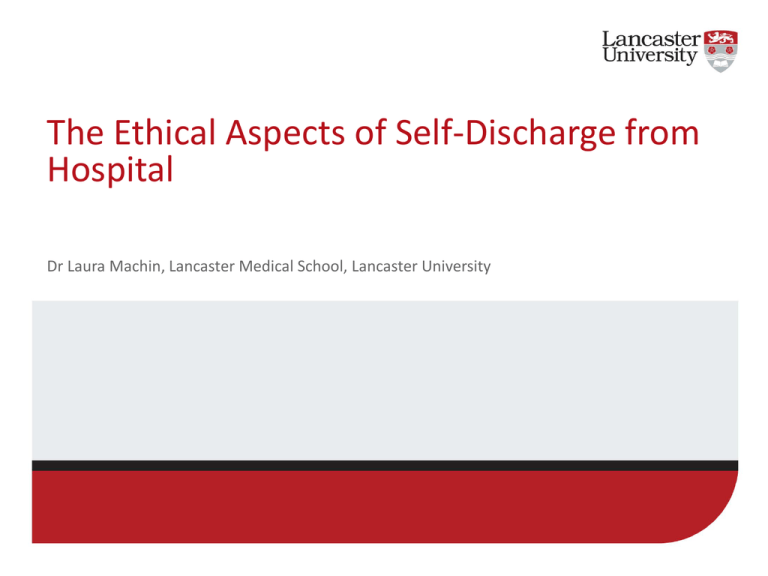
The Ethical Aspects of Self-Discharge from Hospital Dr Laura Machin, Lancaster Medical School, Lancaster University DAMA in context • Discharge against medical advice (DAMA) can be described as when a “patient chooses to leave the hospital before the treating practitioner recommends discharge” • Approximately 2-3% of patients self-discharge each year in the UK and US, and recent figures show it is increasing each year • Particular sections of society thought to be more vulnerable to selfdischarging – Young – Male – Socially disadvantaged – People involved with substance misuse – People from BME groups The story so far…. Reasons • Long waiting times, lack of communication, lack of medical insurance, dissatisfaction with care • Patients who self-discharge are viewed as awkward or noncompliant • Healthcare professionals and the healthcare system are deemed too rigid or insensitive Implications • Staff feel clinical judgement been challenged, authority undermined, or failed in some way • Staff frustrated due to time intensive nature • Distraction for staff • Financially impacting upon already stretched healthcare systems Consequences • Increased morbidity, mortality, readmission rates • Damaging to patient’s health • Patients who self-discharge as poor decisionmakers • Purpose of research is to recommend interventions to reduce selfdischarge DAMA: Always negative? What’s in a name: From DAMA to self-discharge? ‘Discharge against medical advice’ and ‘unauthorised discharge’ • Patients have acted inappropriately and their decision requires explicit justification • Outdated paternalistic approach conflicted with shared decision-making and expert patients • Staff as authoritative and knowledgeable and patients as demanding and their reasoning undermined • An ‘us vs them’ attitude influencing practice and patients’ decision-making? The social and ethical context of self-discharge • Started Feb 2012 • Funding: Lancaster University Early Career Small Grant Scheme • Collaborators: David Warriner, Emily Ford, Steffi Siby, and Dawn Goodwin • Project Aim: How do self-dischargers and health professionals understand and make sense of the concepts ‘self-discharge’, ‘self-dischargers’, and the self-discharge process? • Ethical approval: Institutional and NHS Trust R&D • Data collection: 33 semi-structured, in-depth interviews, faceto-face or phone, between Feb 2013 and April 2014 People who selfdischarged Next of kin of people who self-discharged People who discharged on behalf of a relative People who discharged themselves and on behalf of a relative Lancashire or Cheshire based Cheshire based Lancashire or Cheshire based Lancashire or London based 6 female and 4 male 1 female 2 female 3 female Between 20 and 90 years of age approx Approx 70 years of age Approx 50 years of age Between 40 and 60 years of age approx Discharged from district, general, or specialist hospitals in North of England Husband discharged himself from cardiothoracic ward in district hospital in North of England Discharged spouse or parent from specialist or district hospitals in North of England Discharged from district and general hospitals in South and North of England, and Scotland Cancer, general wards Surgical, general, maternity, paediatric wards Cardiothoracic, surgical, children, psychiatric, medical assessment, urology, maternity wards Nurse Junior doctor General Practitioner Nurse Manager Registrar Consultant Yorkshire based Lancashire based Lancashire or Cumbria based practices Lancashire based Yorkshire based Lancashire or Yorkshire based 1 female and 1 male 1 female and 2 male 1 female and 3 male 1 female 1 female and 2 male 2 female and 2 male Cardiology, Medical Admissions Unit Surgery, cardiology wards Acute Medical ward Cardiology ward Obstetrics and gynaecology, emergency medicine, general medicine General hospitals District hospitals District hospital General hospital District or general hospitals Interview guide for practitioners Interview guide for patients and their relatives Describe a time when you have been involved in cases when patients wish to self-discharge themselves Describe a time when you have self-discharged Why do you believe people discharge themselves from hospital? What prompted you to decide to leave hospital? Could anything have changed your mind? Does the patient’s condition make a difference to how you view self-discharge and the patient? Did you perceive any risks with leaving the hospital? Do the reasons for self-discharge influence how you view self-discharge and the patient? On reflection, do you feel you made the right decision to leave the hospital? Should people who wish to discharge themselves against medical advice always be stopped from doing so? Do you believe patients should have the option to selfdischarge? Can self-discharge be considered as a form of patient empowerment? How would you describe people who self-discharge? Is a patient’s decision to leave a rejection of care offered by practitioners? Is a patient’s decision to self-discharge a negative reflection on the healthcare system or practitioners? Thematic coding Discharge against medical advice: An occasion to demonstrate good care? Dr Laura Machin, Lancaster Medical School, Lancaster University Dr Dawn Goodwin, Lancaster Medical School, Lancaster University Dr David Warriner, Northern General Hospital, Sheffield Aims and questions • Our aim: – To explore the experiences of patients and practitioners who exist beyond the dominant focus of research i.e. young, male, BME groups etc. • Our questions: – Is it possible to discuss the process of self-discharge without resorting to the well-trodden, negative discursive paths apparent in the literature? – Is self-discharge always a failure of care? I am not your enemy! Empathising with one another • Patient’s experience of hospital environment – …they’re [patients] scared of what will go on in hospital…It’s okay to be scared. Hospital isn’t a very nice place… (HPA_02_Con) – …we’re [staff] waking them [patients] up in the middle of the night to check their observations, we’ve got patients coming and going and monitors going off, you get why somebody would much rather be at home in their own bed using their own facilities. (HPB_09_Nur) – Most people have a level of patience but that patience is really tested in NHS wards…because they’re busy. You can’t sleep. There’s people screaming. There’s patients wandering…So you can understand why patients’ patience is tested sorely in hospital. And it’s a very uncomfortable environment. And if patients are ill where they want to be is at home where they feel most comfortable. So it’s a real quagmire (HPB_05_Reg) I am not your enemy! Empathising with one another • Appreciating the rationality of patient’s desire to leave hospital – There were some that I could appreciate that they were very fed up and I could appreciate why they wanted to leave. There have been a couple where I’ve basically thought they were right. (HPA_01_FY) – …half the time when they’re wanting to they’re not actually being unreasonable. Given the same set of circumstances I might want to do exactly what they’re doing. (HPA_04_GP) • Practitioner as fellow patient ≠ ‘us vs them’ approach • Self-discharge as reasonable ≠ patient as poor decision maker I am not your enemy! Empathising with one another • Practitioner’s ability to deliver care in difficult circumstances – I could have quite easily have asked somebody to change my sheets. But they were very busy and you appreciate that they’re very busy and you appreciate that they haven’t got that many staff on. (Sdgr_01_F) – I can only tell you that taken individually they were all alright but because they were so overworked and stressed they got a bit, you know, they were professional but they weren’t kind because they were too stressed. (Sdgr_02_F) – Now saying that, the majority of the staff do care and they’re doing the best they can but they can’t tend to everybody’s needs. (Sdgr_06_F) – So it’s not patient centred care it’s bureaucracy centred care. There are protocols… (Sdgr_10_F) I am not your enemy! Empathising with one another • Impact of decision to self-discharge – I did feel sorry for them, yeah…[but] I thought if I come out there will be one less bed to look after. (Sdgr_02_F) – I think you’re almost doing them a favour to release the bed up…Why would I want to have to use some of the nurses’ time up in the night for them to come and check my bed and make sure I’m there. (Sdgr_01_F) • Self-discharge as reducing workload ≠ patients as difficult and demanding I care: Meeting the unmet need • A cry for help to initiate discussion rather than criticism – We initially will talk to the patients and try and find out why they want to leave. So we try and get to the bottom of it. Explain to them the need for staying and why the doctors feel it’s appropriate to stay. We try to encourage them to stay and talk to a doctor. See if there’s anything else going on. I mean, I’ve met people who when you get to the bottom of it they’ve got problems at home. (HPB_04_Nur) – You just need to spend a few extra minutes to sit down and talk with them. I think that’s a big issue is communication. So I think sometimes you can talk them round. If you just sit them down and say what you’re doing and why you’re doing it most people will stay in hospital. (HPA_FY_02) – So I think exploration is the biggest thing. Because if there is a problem, solving the problem might help… They may be thinking that something is going to happen when it won’t or they may not know something is about to happen, for instance. (HPA_01_GP) I care: Meeting the unmet need • Sources of distress – It’s an indication that patients aren’t happy in that environment. (Sdgr_09_M) – It was difficult because the ward is an uncomfortable place to spend the night and there’s no getting away from that. (Sdgr_13_F) – I don’t like being in hospital. I didn’t like being in the ward environment even though it was actually very good. You absolutely couldn’t criticise it. The staff were very good. I was anxious because I had things to do. So as long as I felt safe I just preferred to leave really. (Sdgr_08_F) – When she went into the hospital she was eager as anything to be back out again. They did all the tests on her and stuff and her heart rate was very high but, again, it was because she was so stressed. She doesn’t like to be in hospital. (Sdgr_04_F) I care: Meeting the unmet need • Creative compromises – But there’s others who for often good psychological reasons often don’t like to be in hospital and are prepared to take their chances at home. And in those cases we try and liaise with the GPs to make sure they get some follow up. (HPB_08_Con) – He basically didn’t want to go to a certain ward in the hospital and he said I’m going home…he explained actually that a family member had died on that ward…So I spoke to the bed manager… he went to a different ward and so he stayed in as a patient. (HPA_02_FY) – some you can negotiate. So they go home and sort the kids out and will come back. (HPA_01_Con) – A recent patient that self-discharged wanted to go to a close friend’s wedding…but I avoided the self-discharge by coaxing/twisting [hospital] Sister’s arm to keep the bed open for three hours. (HPB_05_Reg) – ...we’ll try and reorganise things…and say this is an outpatient’s appointment instead of an inpatient. (HPB_04_Nur) I care: Meeting the unmet need • Treating patients holistically – Therefore trying to understand people holistically in terms of what’s not only their disease process but trying to understand the context of these things means that you can’t treat people without understanding context to be able to treat them properly. (HPA_04_GP) – I think sometimes people get admitted to hospital in a crisis and so therefore if you’re in a crisis often you leave a crisis behind you. So the people who’ve got social and domestic responsibilities or caring responsibilities…[finding] alternatives to hospital admission… may mean that people don’t need these admissions when they’re in a crisis. (HPA_01_GP) • Responding to patient’s care needs ≠ self-discharge not a distraction • Demonstrate care towards patients and patients to feel cared for I matter: Control and care • Hospital processes as restrictive – They may feel that they haven’t got control of their care and this is their way of taking control of that. (HPA_02_GP) – …with our diabetic patients who are self-managing for 365 days a year to then come into hospital and then for everything to be taken away from them, that can be very disempowering. So, yeah, I can absolutely see that the decision to self-discharge would be about wrestling back the control to themselves. (HPB_08_Con) – Sometimes it’s lack of empowerment that makes them want to do that in the first place if they don’t feel that they’ve got any control over what’s happening to them. (HPB_04_Nur) • Self-discharge as a response to lack of control ≠ patients as difficult I matter: Control and care • Voicing and hearing patients – I think you have to be quite empowered actually to self-discharge. We all have to take control of our own health. (HPA_04_GP) – Because the important thing for me was to be in control of what I was doing not just be lying on a bed. (Sdgr_10_F) – I think it gives people a sense of self to be able to say actually I don’t have to stay here for a week or two weeks or whatever they say. If I need to be out, I need to be out. (Sdgr_04_F) • Patients having control over health ≠ self-discharge should be avoided Proposing an alternative view of self-discharge • Self-discharge can be framed positively – Practitioners demonstrated insight into how patients experienced the hospital environment and patients recognised the factors that hindered staff. – Self-discharge enabled patient’s voice to be expressed – Self-discharge created a space for practitioners to identify patients’ needs, and modify and communicate their care • Self-discharge – empathy, empowerment, consideration and care? Proposing an alternative view of self-discharge: Caveat! • Erasing the occasions when lapses in care are experienced? • Suggest that self-discharge is always appropriate? • Instead: – the reasons for the care delivered and received, and the decision made need not be read as intimidating, threatening, or critical as is currently depicted in the literature Implications for practice: Knowns and unknowns • Knowns – Self-discharge should be included in the training of tomorrow’s doctors • Informed by the communication skills training, as well as the sociological, psychological, legal and ethical components of curriculums – The language used in hospital policies and paperwork associated with self-discharge • reflecting the shift in culture of medicine from compliance to advocacy, and paternalism to shared-decision making • Unknowns – Reshape practitioners’ approaches to those patients most likely to discharge?
